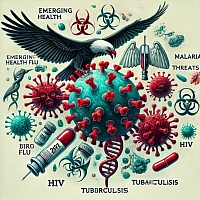Latest Trending News About Health Affairs
Diabetes Epidemic: Cases Quadrupled Since 1990
Diabetes cases have soared, now affecting over 800 million adults globally. The sharp rise is linked to obesity, unhealthy diets, and reduced physical activity.
Low- and middle-income countries face the greatest challenges, with millions untreated.
The WHO calls for stronger policies promoting healthy lifestyles and better healthcare systems to manage the disease effectively.
World AIDS Day 2024: Rights-Centered Approach to End AIDS
The WHO emphasized the theme, "Take the rights path: My health, my right!" for World AIDS Day.
It highlights the need to address inequalities and ensure equitable access to HIV prevention and treatment.
With about 39.9 million people living with HIV globally, the campaign stresses that protecting human rights is vital to ending AIDS as a public health threat by 2030.
Emerging Health Threats: A Growing Global Concern
The world faces several emerging health threats that have the potential to impact public health on a large scale.
Diseases like bird flu (H5N1), malaria, HIV, and tuberculosis (TB) are causing concern due to their ability to spread, mutate, and pose significant health risks. These diseases not only threaten public health but also place immense pressure on healthcare systems worldwide.
1. Bird Flu (H5N1)
Bird flu, particularly the H5N1 strain, has been a cause for alarm since it first emerged. It primarily affects birds, but there is concern about the possibility of it mutating into a form that can spread easily between humans. If this happens, it could lead to a global pandemic, similar to the Spanish flu of 1918.
Risks expected:
High mortality rate in humans if contracted.
The potential to mutate and spread more easily among humans.
Economic consequences, especially in poultry industries worldwide.
Current Situation:
While the spread among humans has been limited, continuous monitoring is required to prevent a potential outbreak.
Public health measures are focusing on early detection and vaccination programs for both humans and birds.
2. Malaria
Malaria, caused by the Plasmodium parasite and transmitted through mosquito bites, remains one of the deadliest diseases, particularly in sub-Saharan Africa.
Despite ongoing efforts to control it, malaria continues to claim millions of lives every year.
Ongoing challenges :
Drug Resistance: The parasite is becoming resistant to the drugs used to treat malaria, making it harder to treat infected individuals.
Vector Resistance: Mosquitoes, which spread the disease, are also becoming resistant to insecticides.
Prevention: The use of mosquito nets, indoor spraying, and antimalarial drugs are crucial to controlling malaria, but resistance undermines these efforts.
Current Situation:
Malaria remains a global health priority. New research is focused on finding effective vaccines and alternative treatment options.
3. HIV (Human Immunodeficiency Virus)
HIV attacks the immune system, and if untreated, can lead to AIDS.
Despite significant advancements in antiretroviral therapy (ART), HIV remains a major public health issue, particularly in developing regions.
Challenges:
Drug Resistance: Some strains of HIV are becoming resistant to existing antiretroviral drugs.
Stigma and Discrimination: Many individuals still face social stigma and barriers to accessing treatment and care.
Prevention: While there is no cure, efforts in prevention, education, and the distribution of ART have significantly reduced HIV-related deaths.
Current Situation:
Ongoing research is focused on finding a cure, improving treatments, and developing vaccines to prevent infection.
4. Tuberculosis (TB)
Tuberculosis is an infectious disease primarily affecting the lungs, but it can also affect other parts of the body.
Despite being preventable and treatable, TB remains a leading cause of death worldwide, especially in countries with limited healthcare access.
Ongoing challenges:
Drug-Resistant TB: Some forms of TB are resistant to standard antibiotics, making treatment longer and more difficult.
Co-Infection with HIV: Individuals living with HIV are more susceptible to TB, which complicates treatment.
Delayed Diagnosis: TB is often diagnosed late due to symptoms being mistaken for other illnesses.
Current Situation:
The rise of drug-resistant TB strains poses a significant challenge to global efforts to eliminate TB. Public health efforts are focusing on improving diagnosis, treatment, and prevention strategies.
Conclusion
- Emerging health threats like bird flu, malaria, HIV, and tuberculosis are expected to be the biggest challenges in the coming years.
- While progress has been made in understanding and treating these diseases, issues like drug resistance, evolving pathogens, and inadequate access to healthcare continue to hinder global health efforts.
- A comprehensive approach, involving vaccination, research, and strengthening healthcare systems, is necessary to combat these threats and protect public health worldwide.

